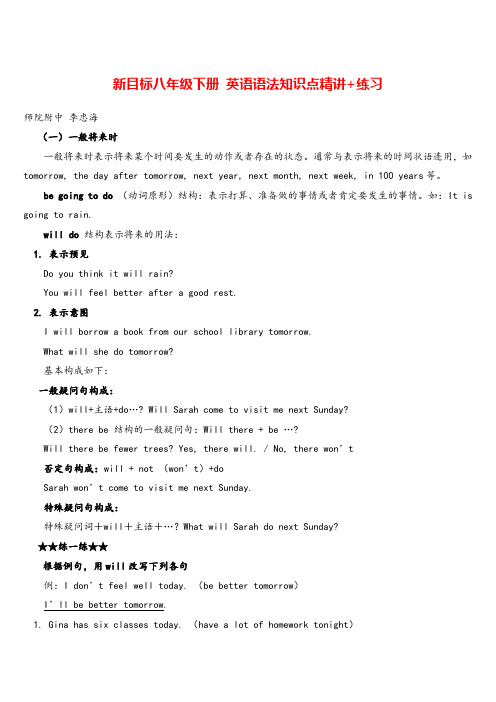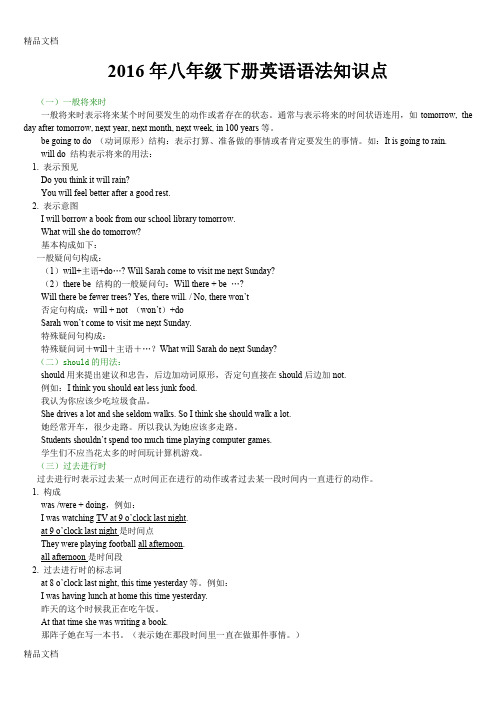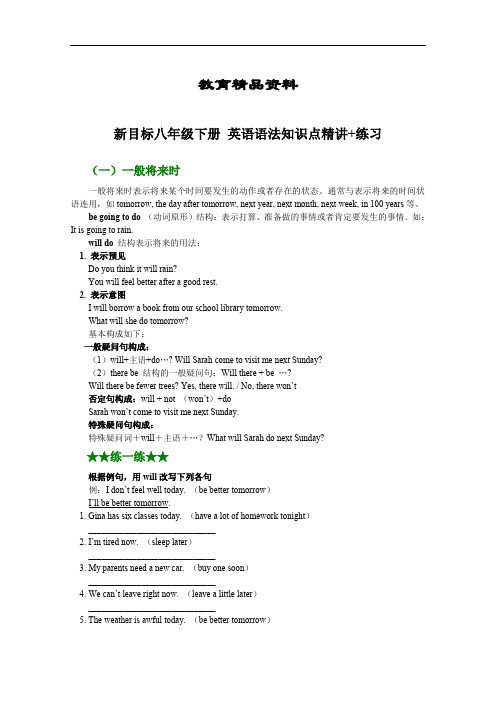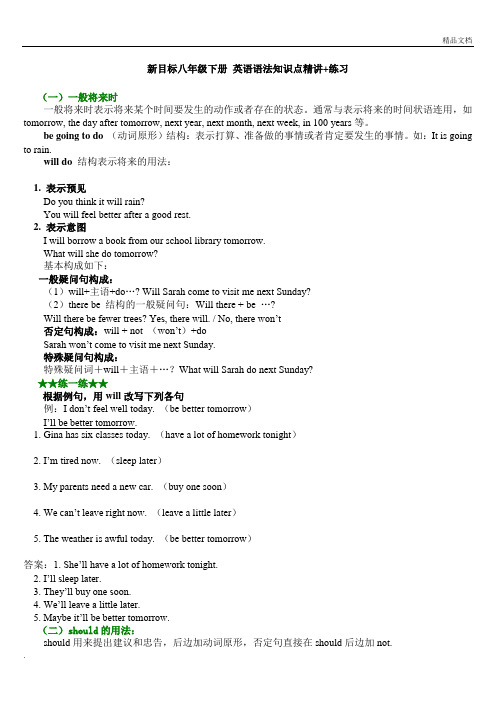人教版本新目标初中八年级的下册的英语语法学习知识点精讲练习.doc
- 格式:doc
- 大小:158.04 KB
- 文档页数:7

新目标八年级下册英语语法知识点精讲+练习师院附中李忠海(一)一般将来时一般将来时表示将来某个时间要发生的动作或者存在的状态。
通常与表示将来的时间状语连用,如tomorrow, the day after tomorrow, next year, next month, next week, in 100 years等。
be going to do(动词原形)结构:表示打算、准备做的事情或者肯定要发生的事情。
如:It is going to rain.will do结构表示将来的用法:1. 表示预见Do you think it will rain?You will feel better after a good rest.2. 表示意图I will borrow a book from our school library tomorrow.What will she do tomorrow?基本构成如下:一般疑问句构成:(1)will+主语+do…? Will Sarah come to visit me next Sunday?(2)there be 结构的一般疑问句:Will there + be …?Will there be fewer trees? Yes, there will. / No, there won’t否定句构成:will + not (won’t)+doSarah won’t come to visit me next Sunday.特殊疑问句构成:特殊疑问词+will+主语+…?What will Sarah do next Sunday?★★练一练★★根据例句,用will改写下列各句例:I don’t feel well today. (be better tomorrow)I’ll be better tomorrow.1. Gina has six classes today. (have a lot of homework tonight)_____________________________2. I’m tired now. (sleep later)_____________________________3. My parents need a new car. (buy one soon)_____________________________4. We can’t leave right now. (leave a little later)____________________________5. The weather is awful today. (be better tomorrow)_____________________________答案:1. She’ll have a lot of homework tonight.2. I’ll sleep later.3. They’ll buy onesoon.4. We’ll leave a little later.5. Maybe it’llbe better tomorrow.(二)should的用法:should用来提出建议和忠告,后边加动词原形,否定句直接在should后边加not.例如:I think you should eat less junk food.我认为你应该少垃圾食品。

新目标八年级下册英语语法知识点精讲带练习(一)一般将来时一般将来时表示将来某个时间要发生的动作或者存在的状态。
通常与表示将来的时间状语连用,如tomorrow, the day after tomorrow, next year, next month, next week, in 100 years等。
be going to do(动词原形)结构:表示打算、准备做的事情或者肯定要发生的事情。
如:It is going to rain.will do结构表示将来的用法:1. 表示预见Do you think it will rain? You will feel better after a good rest.2. 表示意图I will borrow a book from our school library tomorrow. What will she do tomorrow?基本构成如下:一般疑问句构成:(1)will+主语+do…? Will Sarah come to visit me next Sunday?(2)there be 结构的一般疑问句:Will there + be …? Will there be fewer trees? Yes, there will. / No, there won’t 否定句构成:will + not (won’t)+do Sarah won’t come to visit me next Sunday.特殊疑问句构成:特殊疑问词+will+主语+…?What will Sarah do next Sunday?★★练一练★★根据例句,用will改写下列各句例:I don’t feel well today. (be better tomorrow)I’ll be better tomorrow.1. Gina has six classes today. (have a lot of homework tonight)_____________________________2. I’m tired now. (sleep later)_____________________________3. My parents need a new car. (buy one soon)_____________________________4. We can’t leave right now. (leave a little later)_____________________________5. The weather is awful today. (be better tomorrow)_____________________________答案:1. She’ll have a lot of homework tonight. 2. I’ll sleep later. 3. They’ll buy one soon. 4. We’ll leave a little later.5. Maybe it’ll be better tomorrow.(二)should的用法:should用来提出建议和忠告,后边加动词原形,否定句直接在should后边加not.例如:I think you should eat less junk food.我认为你应该少吃垃圾食品。

2016年八年级下册英语语法知识点(一)一般将来时一般将来时表示将来某个时间要发生的动作或者存在的状态。
通常与表示将来的时间状语连用,如tomorrow, the day after tomorrow, next year, next month, next week, in 100 years等。
be going to do (动词原形)结构:表示打算、准备做的事情或者肯定要发生的事情。
如:It is going to rain.will do 结构表示将来的用法:1. 表示预见Do you think it will rain?You will feel better after a good rest.2. 表示意图I will borrow a book from our school library tomorrow.What will she do tomorrow?基本构成如下:一般疑问句构成:(1)will+主语+do…? Will Sarah come to visit me next Sunday?(2)there be 结构的一般疑问句:Will there + be …?Will there be fewer trees? Yes, there will. / No, there won’t否定句构成:will + not (won’t)+doSarah won’t come to visit me next Sunday.特殊疑问句构成:特殊疑问词+will+主语+…?What will Sarah do next Sunday?(二)should的用法:should用来提出建议和忠告,后边加动词原形,否定句直接在should后边加not.例如:I think you should eat less junk food.我认为你应该少吃垃圾食品。
She drives a lot and she seldom walks. So I think she should walk a lot.她经常开车,很少走路。

新目八年下册英法知点精 +(一)一般将来一般将来表示将来某个要生的作也许存在的状。
平时与表示将来的状用,如tomorrow, the day after tomorrow, next year, next month, next week, in 100 years等。
be going to do(原形)构:表示打算、准做的事情也许必然要生的事情。
如:It is going to rain.will do构表示将来的用法:1.表示Do you think it will rain?You will feel better after a good rest.2.表表示I will borrow a book from our school library tomorrow.What will she do tomorrow?基本构成以下:一般疑句构成:(1)will+ 主 +do⋯ ? Will Sarah come to visit me next Sunday?(2)there be构的一般疑句:Will there + be⋯?Will there be fewer trees? Yes, there will. / No, there won’t否定句构成: will + not(won’t)+doSarah won’t come to visit me next Sunday.特别疑句构成:特别疑+ will+主+⋯?What will Sarah do next Sunday?★★ 一★★依照例句,用 will改写以下各句例: I don ’t feel well today.(be better tomorrow)I ’ll be better tomorrow.1. Gina has six classes today.(have a lot of homework tonight)_____________________________2. I’m tired now.( sleep later)_____________________________3. My parents need a new car.(buy one soon)_____________________________4. We can ’t leave right now.( leave a little later)_____________________________5. The weather is awful today.(be better tomorrow)_____________________________答案: 1. She ’ll have a lot of homework tonight.2.I ’ll sleep later.3.They ’ll buy one soon.4.We’ll leave a little later.5.Maybe it ’ll be better tomorrow.(二) should 的用法:should用来提出建和忠告,后加原形,否定句直接在should 后加 not.比方: I think you should eat less junk food.我你少吃垃圾食品。

教育精品资料新目标八年级下册英语语法知识点精讲+练习(一)一般将来时一般将来时表示将来某个时间要发生的动作或者存在的状态。
通常与表示将来的时间状语连用,如tomorrow, the day after tomorrow, next year, next month, next week, in 100 years等。
be going to do(动词原形)结构:表示打算、准备做的事情或者肯定要发生的事情。
如:It is going to rain.will do结构表示将来的用法:1. 表示预见Do you think it will rain?You will feel better after a good rest.2. 表示意图I will borrow a book from our school library tomorrow.What will she do tomorrow?基本构成如下:一般疑问句构成:(1)will+主语+do…? Will Sarah come to visit me next Sunday?(2)there be 结构的一般疑问句:Will there + be …?Will there be fewer trees? Yes, there will. / No, there won’t否定句构成:will + not (won’t)+doSarah won’t come to visit me next Sunday.特殊疑问句构成:特殊疑问词+will+主语+…?What will Sarah do next Sunday?★★练一练★★根据例句,用will改写下列各句例:I don’t feel well today. (be better tomorrow)I’ll be better tomorrow.1. Gina has six classes today. (have a lot of homework tonight)_____________________________2. I’m tired now. (sleep later)_____________________________3. My parents need a new car. (buy one soon)_____________________________4. We can’t leave right now. (leave a little later)_____________________________5. The weather is awful today. (be better tomorrow)_____________________________答案:1. She’ll have a lot of homework tonight.2. I’ll sleep later.3. They’ll buy one soon.4. We’ll leave a little later.5. Maybe it’ll be better tomorrow.(二)should的用法:should用来提出建议和忠告,后边加动词原形,否定句直接在should后边加not.例如:I think you should eat less junk food.我认为你应该少吃垃圾食品。

新目标八年级下册英语语法知识点精讲+练习(一)一般将来时一般将来时表示将来某个时间要发生的动作或者存在的状态。
通常与表示将来的时间状语连用,如tomorrow, the day after tomorrow, next year, next month, next week, in 100 years等。
be going to do(动词原形)结构:表示打算、准备做的事情或者肯定要发生的事情。
如:It is going to rain.will do结构表示将来的用法:1. 表示预见Do you think it will rain?You will feel better after a good rest.2. 表示意图I will borrow a book from our school library tomorrow.What will she do tomorrow?基本构成如下:一般疑问句构成:(1)will+主语+do…? Will Sarah come to visit me next Sunday?(2)there be 结构的一般疑问句:Will there + be …?Will there be fewer trees? Yes, there will. / No, there won’t否定句构成:will + not (won’t)+doSarah won’t come to visit me next Sunday.特殊疑问句构成:特殊疑问词+will+主语+…?What will Sarah do next Sunday?★★练一练★★根据例句,用will改写下列各句例:I don’t feel well today. (be better tomorrow)I’ll be better tomorrow.1. Gina has six classes today. (have a lot of homework tonight)_____________________________2. I’m tired now. (sleep later)_____________________________3. My parents need a new car. (buy one soon)_____________________________4. We can’t leave right now. (leave a little later)_____________________________5. The weather is awful today. (be better tomorrow)_____________________________答案:1. She’ll have a lot of homework tonight.2. I’ll sleep later.3. They’ll buy one soon.4. We’ll leave a little later.5. Maybe it’ll be better tomorrow.(二)should的用法:should用来提出建议和忠告,后边加动词原形,否定句直接在should后边加not.例如:I think you should eat less junk food.我认为你应该少吃垃圾食品。
新目标八年级下册英语语法知识点精讲+练习(一)一般将来时一般将来时表示将来某个时间要发生的动作或者存在的状态。
通常与表示将来的时间状语连用,如tomorrow, the day after tomorrow, next year, next month, next week, in 100 years等。
be going to do(动词原形)结构:表示打算、准备做的事情或者肯定要发生的事情。
如:It is going to rain.will do结构表示将来的用法:1. 表示预见Do you think it will rain?You will feel better after a good rest.2. 表示意图I will borrow a book from our school library tomorrow.What will she do tomorrow?基本构成如下:一般疑问句构成:(1)will+主语+do…? Will Sarah come to visit me next Sunday?(2)there be 结构的一般疑问句:Will there + be …?Will there be fewer trees? Yes, there will. / No, there won’t否定句构成:will + not (won’t)+doSarah won’t come to visit me next Sunday.特殊疑问句构成:特殊疑问词+will+主语+…?What will Sarah do next Sunday?★★练一练★★根据例句,用will改写下列各句例:I don’t feel well today. (be better tomorrow)I’ll be better tomorrow.1. Gina has six classes today. (have a lot of homework tonight)_____________________________2. I’m tired now. (sleep later)_____________________________3. My parents need a new car. (buy one soon)_____________________________4. We can’t leave right now. (leave a little later)_____________________________5. The weather is awful today. (be better tomorrow)_____________________________答案:1. She’ll have a lot of homework tonight.2. I’ll sleep later.3. They’ll buy one soon.4. We’ll leave a little later.5. Maybe it’ll be better tomorrow.(二)should的用法:should用来提出建议和忠告,后边加动词原形,否定句直接在should后边加not.例如:I think you should eat less junk food.我认为你应该少吃垃圾食品。
新目标八年级下册英语语法知识点精讲+练习(一)一般将来时一般将来时表示将来某个时间要发生的动作或者存在的状态。
通常与表示将来的时间状语连用,如tomorrow, the day after tomorrow, next year, next month, next week, in 100 years等。
be going to do(动词原形)结构:表示打算、准备做的事情或者肯定要发生的事情。
如:It is going to rain.will do结构表示将来的用法:1. 表示预见Do you think it will rainYou will feel better after a good rest.2. 表示意图I will borrow a book from our school library tomorrow.What will she do tomorrow基本构成如下:一般疑问句构成:(1)will+主语+do… Will Sarah come to visit me next Sunday(2)there be 结构的一般疑问句:Will there + be …Will there be fewer trees Yes, there will. / No, there won’t否定句构成:will + not (won’t)+doSarah won’t come to visit me next Sunday.特殊疑问句构成:特殊疑问词+will+主语+…What will Sarah do next Sunday★★练一练★★根据例句,用will改写下列各句例:I don’t feel well today. (be better tomorrow)I’ll be better tomorrow.1. Gina has six classes today. (have a lot of homework tonight)_____________________________2. I’m tired now. (sleep later)_____________________________3. My parents need a new car. (buy one soon)_____________________________4. We can’t leave right now. (leave a little later)_____________________________5. The weather is awful today. (be better tomorrow)_____________________________答案:1. She’ll have a lot of homework tonight.2. I’ll sleep later.3. They’ll buy one soon.4. We’ll leave a little later.5. Maybe it’ll be better tomorrow.(二)should的用法:should用来提出建议和忠告,后边加动词原形,否定句直接在should后边加not.例如:I think you should eat less junk food.我认为你应该少吃垃圾食品。
新目标八年级下册英语语法知识点精讲+练习(一)一般将来时一般将来时表示将来某个时间要发生的动作或者存在的状态。
通常与表示将来的时间状语连用,如tomorrow, the day after tomorrow, next year, next month, next week, in 100 years等。
be going to do(动词原形)结构:表示打算、准备做的事情或者肯定要发生的事情。
如:It is going to rain.will do结构表示将来的用法:1. 表示预见Do you think it will rainYou will feel better after a good rest.2. 表示意图I will borrow a book from our school library tomorrow.What will she do tomorrow基本构成如下:一般疑问句构成:(1)will+主语+do…Will Sarah come to visit me next Sunday(2)there be 结构的一般疑问句:Will there + be …Will there be fewer trees Yes, there will. / No, there won’t否定句构成:will + not (won’t)+doSarah won’t come to visit me next Sunday.特殊疑问句构成:特殊疑问词+will+主语+…What will Sarah do next Sunday★★练一练★★根据例句,用will改写下列各句例:I don’t feel well today. (be better tomorrow)I’ll be better tomorrow.1. Gina has six classes today. (have a lot of homework tonight)_____________________________2. I’m tired now. (sleep later)_____________________________3. My parents need a new car. (buy one soon)_____________________________4. We can’t leave right now. (leave a little later)_____________________________5. The weather is awful today. (be better tomorrow)_____________________________答案:1. She’ll have a lot of homework tonight.2. I’ll sleep later.3. They’ll buy one soon.4. We’ll leave a little later.5. Maybe it’ll be better tomorrow.(二)should的用法:should用来提出建议和忠告,后边加动词原形,否定句直接在should后边加not.例如:I think you should eat less junk food.我认为你应该少吃垃圾食品。
2016年八年级下册英语语法知识点(一)一般将来时一般将来时表示将来某个时间要发生的动作或者存在的状态.通常与表示将来的时间状语连用,如tomorrow, the day after tomorrow,next year,next month,next week, in 100 years等.be going to do (动词原形)结构:表示打算、准备做的事情或者肯定要发生的事情。
如:It is going to rain.will do 结构表示将来的用法:1。
表示预见Do you think it will rain?You will feel better after a good rest.2。
表示意图I will borrow a book from our school library tomorrow.What will she do tomorrow?基本构成如下:一般疑问句构成:(1)will+主语+do…? Will Sarah come to visit me next Sunday?(2)there be 结构的一般疑问句:Will there + be …?Will there be fewer trees? Yes,there will. / No,there won’t否定句构成:will + not (won’t)+doSarah won’t come to visit me next Sunday。
特殊疑问句构成:特殊疑问词+will+主语+…?What will Sarah do next Sunday?(二)should的用法:should用来提出建议和忠告,后边加动词原形,否定句直接在should后边加not。
例如:I think you should eat less junk food。
我认为你应该少吃垃圾食品。
She drives a lot and she seldom walks. So I think she should walk a lot.她经常开车,很少走路。
2016 年八年级下册英语语法知识点(一)一般将来一般将来表示将来某个要生的作或者存在的状。
通常与表示将来的状用,如day after tomorrow, next year, next month, next week, in 100 years等。
be going to do (原形)构:表示打算、准做的事情或者肯定要生的事情。
如:will do构表示将来的用法:1.表示Do you think it will rain?You will feel better after a good rest.2.表示意I will borrow a book from our school library tomorrow.What will she do tomorrow?基本构成如下:一般疑句构成:(1) will+ 主 +do⋯ ? Will Sarah come to visit me next Sunday?(2) there be构的一般疑句:Will there + be⋯?Will there be fewer trees? Yes, there will. / No, there won’t否定句构成: will + not(won’t)+doSarah won’t come to visit me next Sunday.特殊疑句构成:特殊疑+ will+主+⋯?What will Sarah do next Sunday?(二) should 的用法:should用来提出建和忠告,后加原形,否定句直接在should 后加 not.例如: I think you should eat less junk food.我你少吃垃圾食品。
She drives a lot and she seldom walks. So I think she should walk a lot.她常开,很少走路。
所以我她多走路。
Students shouldn ’t spend too much time playing computer games.学生不当花太多的玩算机游。
(三)去行去行表示去某一点正在行的作或者去某一段内一直行的作。
1.构成was /were + doing,例如:I was watching TV at 9 o ’clock last night.at 9 o ’clock last night是点They were playing football all afternoon.all afternoon是段tomorrow, the It is going to rain.2.过去进行时的标志词at 8 o ’clock last night, this time yesterday Iwas having lunch at home this time yesterday.等。
例如:昨天的这个时候我正在吃午饭。
At that time she was writing a book.那阵子她在写一本书。
(表示她在那段时间里一直在做那件事情。
)练一练用括号中所给动词的适当形式填空。
1. This time yesterday I ____ ______ ( read )books.2. At 9 o ’clock last Sunday they ______ ______ (have) a party.3. When I _____ ( come) into the classroom, she ________ ______ ( read ) a storybook.4. She _____ ______ ( play )computer games while her mother ____ ______ ( cook) yesterday afternoon.5. I _____ ______ ( have) a shower when you _______ (call ) me yesterday.答案: 1. was reading 2. were having 3. came; was reading4. was playing; was cooking5. was having; called(四)间接引语形成步骤:(1)不要逗号,冒号,引号(2)要考虑到人称的变化(人称的变化与汉语是一致的)(3)要考虑时态的变化(4)要考虑时间状语、地点状语和语示代词的变化。
1.直接引语变成间接引语时,几个主要时态的变化规律直接引语间接引语一般现在时一般过去时一般将来时过去将来时现在进行时过去进行时2.直接引语变成间接引语时,一些词汇的变化规律直接引语间接引语1. am / is2. are1. was2. were3. have / has 3. had4. will5. can6. may 4. would5. could6. might练一练用括号中所给动词的适当形式填空。
1. She said I _____ ( be) hard-working.2. Peter told me he _____ (be) bored yesterday.3. She said she _____ ( go)swimming last Sunday.4. Bobby said he _____ ( may) call me later.5. Antonio told me he _____ ( read )a book then.答案: 1. was 2. was 3. went 4. might 5. was reading述他人的:1. I go to the beach every Saturday. ( Tom)2. I can speak three languages. ( Lucy)3. I will call you tomorrow. ( Mike )4. I ’m having a surprise party for Lana. (she )(五) if引的条件状从句构: if +一般在,主+将来含:如果⋯⋯,将要⋯⋯例如: If you ask him, he will help you.如果你求他,他会帮助你。
If need be, we’ll work all night.如果需要,我就干个通宵。
一根据中文提示,完成句子。
1.如果你参加聚会,你将会得很开心。
2.如果明天下雨,我将不去野餐。
3.如果你常听英文歌,你将会喜英的。
If you often ________, you _________________.答案:1. If you go to the party, you will have a good time2. If it rains tomorrow, we won ’t go to the picnic3. If you often listen to English songs, you ’ll like English二. 完形填空特点及解思路(一)型分与特点完形填空是在出的一篇短文中有目的地拿掉若干个,留下一些空格,要求考生借助短文保留的部分,从所的短文整体出,在正确理解短文意思的基上,根据句子和句子的内在系、的用法和搭配等,用适当的或填空,使全后的短文意思通、前后、构完整。
种型的内容从形式上看是或短的填空,但它必注意到短文中上、下文意思、搭配和法构正确,所以在空格上所填的必符合适用和法正确两条原,只考某一面都可能致。
中考中完形填空的基本型分两:完形填空和完形填空。
1.完形填空:型的特点是将一篇短文中若干抽掉留下空格,每一空格提供若干个,要求考生通短文后,在理解短文意思的基上,运用所学的、句型、法等言知,从所提供的中出一个最佳答案,使短文内容完整正确。
中考完形填空主要以这种题型为主。
它所给的短文一般与初中英语教材难易程度相当,字数在150- 200 个单词之内,多数设置10 个左右空格,所设考点涉及词汇、语法及对短文内容的理解。
短文的第一句一般不设空,以期提供一个语境,对每一空格设置的选项基本都属于相同或对等的词类,给判定选择带来一定的干扰,侧重考查了考生准确运用词汇的能力及对短文的整体理解和逻辑推理能力。
2.选词填空题:该题型的特点是把抽出的词打乱顺序,不按原文顺序排列,放在短文前面或后面的方框内,有时还增加几个文外的词,要求考生从中选出适当的词以正确的形式填入短文空格内。
完形填空选择题的一般解题思路是:1.跳过空格、通读全文、把握大意。
先跳过空格,通读试题所给的要完形填空的短文,获得整体印象,做到弄清文脉、抓住主旨,较好地把握短文大意。
要在阅读理解短文意思的基础上才开始判定选择,切忌仓促下笔。
2.结合选项、综合考虑、初定答案。
在理解全文意思的基础上,再结合所给备选项细读全文,联系上、下文内容,注意从上、下文的语法结构和词语搭配及从选择项中寻找解题的提示,以词、句的意义为先,再从分析句子结构入手,根据短文意思、语法规则、词语固定搭配等进行综合考虑,对备选项逐一进行分析、比较和筛选,排除干扰项、初步选定答案。
3.瞻前顾后、先易后难、各个击破。
动笔时要瞻前顾后、通篇考虑、先易后难。
对比较明显直接的、自己最有把握的答案先做,一下子不能确定答案的,先跳过这一空格,继续往下做,最后回过头来再集中精力解决难点。
这时可结合已确定答案的选项再读一遍短文,随着对短文理解的深入,可以降低试题的难度,提高选择的正确率。
4.复读全文、逐空验证、弥补疏漏。
完成各道题选择后,把所选的答案代入原文,再把全文通读一篇,逐空认真复查。
看所选定的答案是否使短文意思前后连贯、顺理成章,语法结构是否正确,是否符合习惯表达法。
如发现错误答案或有疑问的,应再次推敲、反复斟酌、做出修正。
完形填空试题的一般解题思路是:1.跳过空格、通读短文、了解大意。
解题时先跳过空格,通读完形填空的短文,了解全篇的内容和要旨。
要重视首句,善于以首句的时态、语气为立足点,理清文脉,推测全文主题及大意。
2.复读短文、确定语义、判断词形。
把握短文大意后再认真复读短文,利用上下文的语境,结合所学过的知识,先确定空格处所需词语的意义,再根据空格在句子中的位置,判断其在句中充当的成分,从而确定所填词的词性,再依据词语搭配和语法规则,判断所填的词的正确形式。
3.三读短文、上下参照、验证答案。
在短文的每一空白处填上一个词后,将完成的短文再细读一遍,上下参照,连贯思考。
把所填的答案放入短文中进行检验,可从上、下文内容是否协调一致、顺理成章,语法结构是否正确无误等进行综合验证,凡有疑问必须重新推敲考虑。